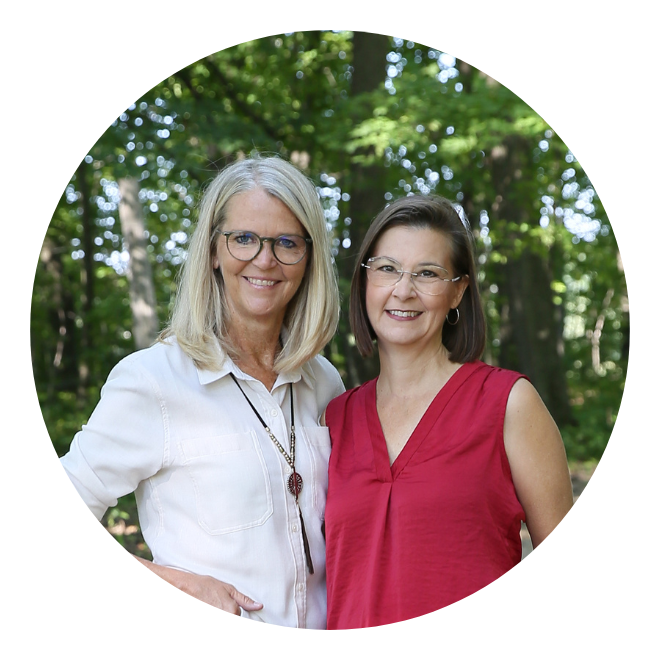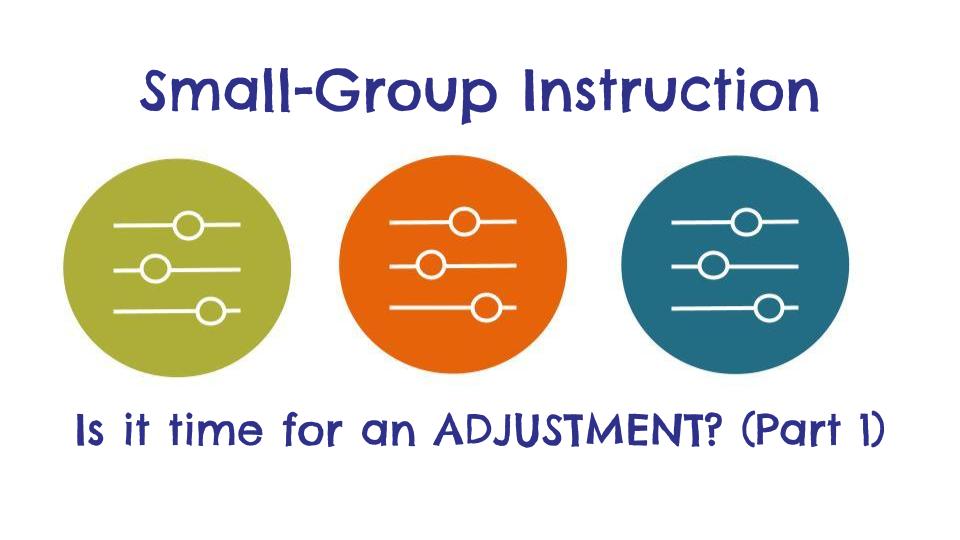What about small-group instruction?
What changes in light of new learning?
What stays the same?
If you’re like many of the educators we work with, questions like these are top of mind as you consider shifts to more brain-friendly literacy instruction for early decoders.
There’s no question that small-group instruction still plays a vital differentiation role in the literacy classroom. But it might be time for some adjustments.
So in this post, and the next, we focus on small-group instruction, offering 5 possible adjustments today and another 5 next week.
First, we “zoom out” to identify things you are probably already doing that are STILL IMPORTANT. And then, we “zoom in” on each of those aspects of small-group instruction to explore some of the ways they might need some ADJUSTING as you move toward more science-aligned, small-group instruction.

There’s a lot to think about here, and we are excited to have the conversation!😊
- It’s STILL IMPORTANT to form small groups based on assessment data.
What is the ADJUSTMENT?
Rather than grouping based on leveled-text assessments, the shift to more science-aligned practice includes organizing groups based on specific skill needs identified through skill-specific assessments. And although phonics skills are the most common organizing structure when working with beginning decoders, don’t forget to tune in to other critical elements for proficient reading, such as phonemic awareness and oral language.
- It’s STILL IMPORTANT to allocate small-group time to students with greater needs.
What is the ADJUSTMENT?
Rather than trying to meet with every student every day, start by ensuring robust initial instruction with the whole group. Reserve small-group instructional time for the students who need extra practice and support to reach mastery or for students who need to stretch beyond the whole-group content.
- It’s STILL IMPORTANT to revisit groupings periodically.
What is the ADJUSTMENT?
Rather than wait to reassess students’ progress a few times each year to regroup according to a guided reading level, shift to more fluid, skills-based grouping. To adjust your groupings, rely more on your ongoing formative data collection (dictation is one of our favorite options for ongoing monitoring of phonics skills mastery). Again, phonics isn’t the only thing to think about in terms of becoming a proficient reader, so also gather data on language comprehension and phonemic awareness.
- It’s STILL IMPORTANT to offer word-level instruction and practice (phonics, phonemic awareness, vocabulary) before students read connected texts.
What is the ADJUSTMENT?
Rather than doing word work, which focuses on preparing students to read a particular leveled text you’ve selected, the change is to word-recognition instruction that follows the sequential and systematic path of your phonics scope and sequence. For beginning decoders, differentiation group-by-group will be based on students’ mastery of those sequential skills.
- It’s STILL IMPORTANT to provide opportunities to read connected texts.
What is the ADJUSTMENT?
We can all agree that moving beyond word-level work to reading connected text is important. But for beginning readers, rather than selecting small-group texts by guided reading level, the adjustment to practice is selecting texts that tightly align to the identified decoding skills that students need to practice. These texts–typically referred to as decodable texts— become an extension of the phonics instruction, providing concentrated practice with the target skills. And don’t worry; kids don’t need to read decodable texts forever, and they still need time to listen to trade books read aloud and to explore them on their own. Decodable texts are just a more brain-friendly starting point for their reading practice.) Also, if you want to read more about this topic, text selection for beginning readers is the focus of Shift 6 in Shifting the Balance.
There we are! That was five.
Of course, revising your small-group instruction likely won’t happen all at once, but we encourage you to find a starting point and jump in. Change is about progress, not perfection. Momentum has to start somewhere.
We invite you to spend a week thinking and acting in response to these first five adjustments, and we’ll be back next week with part 2 of this series, where we will share five more ideas to consider as you revise your small-group instruction in light of reading science.
If you don’t want to stop here, or you’re looking for a way to get started with small-group instruction, you could explore our 8- part blog series “Using our Flexible Phonics Lesson Template.”👇
-

Jan Burkins and Kari Yates are authors, speakers, and consultants, who are dedicated to helping teachers around the world translate reading science into simple instructional moves that help teachers make learning to read easier for their students while still centering meaning-making, engagement, and joy.
Recent Posts



I cannot wait to share this with the teachers at my school! Excellent and well-said, as always! Thank you for sharing this important info!
We’re happy to hear that this will be useful to you. Everyone is working so hard on behalf of kids!
I already do these things so it’s nice to know I’m making the right decisions when instructing in small groups!
Thanks for connected. Happy small group learning!
Thank you for this critical information. Because I’m old 😉 and had a lot of years learning with and from young readers, I saw that phonics and often phonemic awareness was the biggest factor in forming groups. Those groups were fluid. Your comment about assessing through writing was exactly what i noticed. When kids learned new sounds, made small words with onset and rime and then wrote those words, I could see clearly when they “owned” new phonemes.
Thank you also for your advice about not feeling the pressure to meet with groups every day. It’s not possible. Shared reading and whole group quick mini-lessons were the perfect place to teach and revisit to those who needed that support. Whole group support works well, too!
We’re so glad you’re finding the content helpful! THanks for all you do!